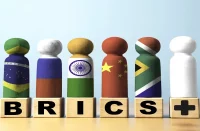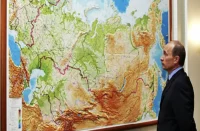A look at the events of 1939-45 from a millennial point of view.
Many people in Russia believe that we live in an era where the West has won. The West surrounds us everywhere. It reigns in popular car models and clothing fashion labels, in photographs of pop idols and political brands. We figuratively and literally dance to the music of the West. Who can doubt the triumph of a victorious civilization?
But that is the opinion of people who lived through the fall of the Iron Curtain and were literally knocked off their feet by a mighty avalanche of forbidden values that surged through the broken dam. In a panic, we are even prepared to call commonplace market relationships “a Western achievement,” although the market existed in ancient Sumer and Xian thousands of years before Wall Street.
The American ideologue Patrick Buchanan has written a book called “Death of the West.” That provocative title was meant to give it advertising impact. Each line reveals the sincere anxiety of an American patriot who is concerned not just for his own country but for the entire crumbling Euro-Atlantic civilization.
An exaggeration, you say? Perhaps it is a bit of overkill. But what is actually going on with the West? Is it advancing or is it dying? Or is it advancing while it dies?
As we sit on a beach admiring the waves rolling in, we see ebbs and flows; it is hard to tell whether the tide is coming in or going out. In order to answer the question correctly, we must broaden our time horizon. We need to find reference points—lighthouses and piers from a century ago. If we turn from the seashore to the history of civilizations and begin searching humanity’s past for the beacons we need, the answer we find will bode ill for the West.
The Briton Arnold Toynbee first introduced the concept of “civilization” into scientific discourse. He played the same role in the study of history and culture that Linnaeus did in botany and Mendeleev did in chemistry. Toynbee divided his contemporary world into seven living civilizations: Russian, Middle Eastern (the heirs of Byzantium), Islamic, Hindu, Far Eastern (Chinese) and Japanese. The British genius was convinced that six of the seven were already showing signs of fracture and were entering the stage of decline. He also believed that the West had put its contemporaries in an impossible position by catching them in a net of economic and political power. Toynbee wrote about this in the 1930s, on the eve of World War II, and his judgments closely mirrored the attitude of the Western man in the street.
But in less than two decades, the complacent self-confidence of people in the West was replaced by a panicky fear that the “Russians are coming!” The Russia issue was temporarily resolved within half a century, but new giants appeared—China and the Islamic world—and their current situation cannot be described as “hopeless.” Toynbee himself dropped his previous categories after World War II and moved his native Western civilization off his list of unquestioned world leaders and placed it in the category of arguable leaders.
Let us consider the position that the West (that is, Protestant-Catholic Europe and its sister Anglo-Saxon countries in the New World) held during Toynbee’s time and what is happening with the West now, right before our eyes.
During the early 20th century, the West forcefully exported its culture to all countries of the world, without exception. The West collected foreign values only as museum pieces. No one today would call African rap, Indian yoga, Eastern martial arts or the Chinese horoscope museum pieces. Foreign roots are deeply embedded in Western society and increasingly influence its popular culture.
In the early 20th century, Western population grew rapidly and established colonies in new lands (the French in North Africa and the English in the South, just as they had in previous centuries—in America and Oceania). Today, the population of Western peoples is declining, and people from other civilizations not only are carrying out a “demographic reconquista” in the Transvaal and Texas, they are also colonizing the heart of Europe, where no outsider had ever before set foot.
At the dawn of the 20th century, Western countries were producing more than 90% of the world’s industrial output and three-quarters of its GDP. Today, they account for no more than half of global production, and economic dynamics clearly suggest that the West will be unable to reverse the trend. American stores are already filled with Chinese goods, and pharmacies with Indian pharmaceuticals.
Finally, the most obvious changes affect the way the world is partitioned. A century ago all non-Western countries (other than Russia) were either colonies or semi-colonies of Western civilization. According to the rules of Sid Meier’s famous game “Civilization,” control of 66% of the planet’s territory means global victory. And the West controlled more than 80% of the world’s land masses! All of the colonial administrations have now gone home, and direct territorial control is no longer an issue. Not even control of occupied Iraq and Afghanistan, where NATO soldiers dare not risk leaving their strongholds!
So, it stands to reason: the West in our day is a declining civilization. It is still a powerful, very influential civilization—but it has been forced to retreat like a cancer under the onslaught of its rapidly advancing neighbors. Moreover, it is retreating on all fronts for the first time in its thousand year history, for the first time since the Crusades.
When did this earthshaking event take place? When did the sun of the West cross its zenith? There can be no doubt whatsoever regarding the date. The ascendancy of the West ceased immediately after 1945. Its colonial empires collapsed after the fall of the Reichstag (on a historical scale, it happened almost immediately). The red flag was raised over Germany’s capital, and within two decades a throng of national flags waved over the capitals of former colonies: from Jakarta to Suriname, from Dakar to Hanoi.
The relationship between the outcome of World War II and the collapse of the colonial system is even more surprising because the empires that collapsed belonged to the victors: France, Belgium, Holland and even Great Britain. Whereas in 1920 the Versailles Treaty increased the domains of Britain and France at the expense of the vanquished, the Potsdam Agreement had the opposite effect.
It is absurd to link the world-wide postwar freedom parade with the humanism of Western democracies—each concession was preceded by bitter wars of liberation and colonial expeditions. But the expeditions could do nothing after 1945. The world had changed. And it was not solely a result of the bipolarity that had developed, nor was it entirely due to the fact that native guerrillas were counting on Soviet assistance. After 1945, the myth of the undisputed superiority of Western man and his inherent right to rule crumbled.
The defeat of German Nazism and the collapse of the concept of a “super race” signaled the failure of the West’s entire global strategy. The “white man’s burden” glorified by Rudyard Kipling had lost its ideological foundations. Without that concept, it became impossible to rule “Your new-caught, sullen peoples / half devil and half child” (R. Kipling, “The White Man’s Burden,” emphasis added).
The Russians offered an alternative philosophy of the universe, based on the equality of all people, regardless of race or cultural background. Although the ideology of the true victors of 1945 was clothed in the materialistic formula of communism, it in fact traces back to the Gospel message: “Where there is neither Greek nor Jew, circumcision nor uncircumcision, Barbarian, Scythian, bond nor free: but Christ is all, and in all.”
By defeating German Nazism in World War II, the Russians proved to the entire world that people of other races and cultures are not half-devils and half-children, but are people with the same rights as others to develop on their own. And the German, British or American sahib dares not prod them to develop, even though he may be very enamored of his messianic “white man’s burden.” The concept of the multipolar world has won out over the unipolar concept.
That is the main ideological outcome of World War II. In essence, the existential question of universal being was resolved on its battlefields. I would state the question thus: are all people in the world brothers, created by one God? Or was humanity begot by unequal tribal totems (as Paganism teaches) and is there a natural hierarchy of “superior” and “inferior” peoples?
Despite its outward acceptance of Christianity, Western civilization from its birth believed in the inequality of peoples and in its absolute superiority over at the societies that surround it. Hitlerism was not an aberration, as many believe, but rather the quintessence of Western political practice. The defeat of Hitler by a non-Western, “barbarian” civilization produced a deep fissure in the West’s traditional world-view and initiated the extinction of Western civilization as a whole.
The instinctive recognition of this truth, which oppresses Westerners at home and abroad, forces them to redouble their efforts to prove the unprovable—to belittle the role of the Soviet Union in the Victory of 1945 while simultaneously glorifying the role of Great Britain and the United States.
The article was written by the Russian blogger Vladimir Timakov at win.ru and translated by Vebber.














Good blog with some interesting information. I am going to be back.
Thanks a ton for talk about particularly superior informations. Your web is excellent, I am fascinated by the important information that you just have on this weblog. It reveals how properly you realize this topic. Bookmarked this page, will arrive back for additional. You, my close friend, I discovered just the important information I by now searched all over the place and just couldn’t come across. What a perfect website. Such as this webpage your site is one of my new preferred.I similar to this info shown and it has provided me some kind of creativity to possess achievement for some explanation, so hold up the fine work!
What did Our God of Torah say? — 9:17 And God said unto Noah: ‘This is the token of the covenant which I have established between Me and all flesh that is upon the earth.’